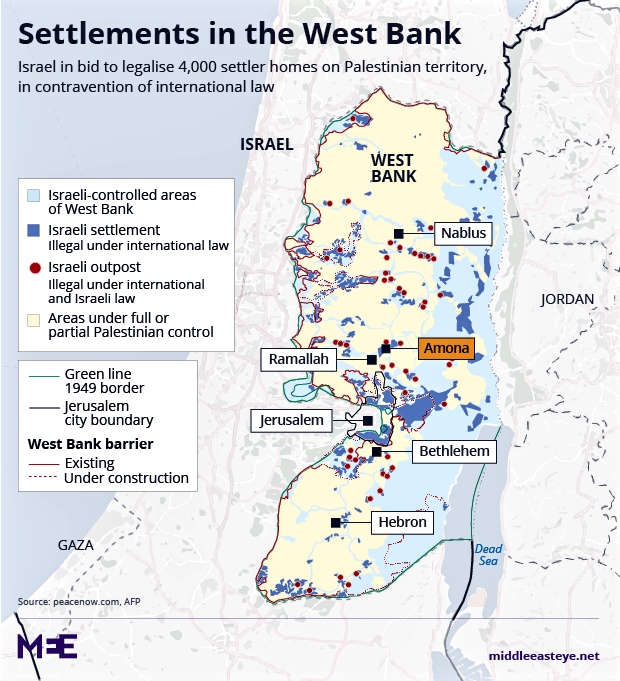
The 40-year-old Israeli document that forms the backbone of an apartheid state
Forty years after the publication of the Koenig Memo (or Koenig Document), a new look at this historic paper is necessary to answer a key question: is it the foundation for designating Israel as an apartheid regime in accordance with international law?
But what is the Koenig Memo?
In September 1976, the Israeli Al Hamishmar newspaper published a memorandum which made recommendations as to how to deal with Palestinians living inside the state of Israel, who are considered citizens according to Israeli law.
What is apartheid?
Apartheid is a crime against humanity in accordance with the 2002 Rome Statute of the International Criminal Court. Three conditions must be fulfilled for a practice to be labelled as “apartheid”
- Two or more racial groups must exist
- The ruling racial group must carry out inhumane practices against the other racial group or groups
- These inhumane practices must be carried out in a methodological and institutional manner by the ruling race, whose objective is to perpetuate this situation
Why this secret document was published then, and who wrote it, was unknown at the time. In the years after it was leaked, no Israeli government figure repudiated its recommendations, though the Israeli government was somewhat embarrassed that this content was made public. Its anonymous authorship and secrecy is open to speculation.
As the narrative of the document implies, its publication was seemingly part of a plan to incite intimidation and hostility towards Palestinians.
Voices have subsequently called for Israel to be prosecuted in international courts for crimes against humanity, defined as crimes that it has committed, and continues to commit, against Palestinians. These victims include Palestinian Arab citizens of Israel, who have fallen foul of the state's policy of racial discrimination.
Where does the Koenig Memo fit into this?
Masking the truth
Clear and explicit documents issued by the Israeli government are not easily accessible, something which further adds to the sense that Israel operates an apartheid system. The state is keen to cover up the policy of racial discrimination by masking it: uncovering the truth can be very difficult. Perhaps the Koenig Document was the first to explicitly and clearly state hidden truths.
The document was named after Yisrael Koenig, who is said to have prepared it, although sources suggest that there were others who contributed to its production. Koenig served as the director general of the Northern District to the interior ministry from 1967 for 26 years. There, he was directly responsible for the largest proportion of 1948 Palestinians who lived in the north of the country.
Throughout there is one assumption: that Arab citizens are to be regarded as enemies and backwards
Others who are thought to have contributed include Tsavi Aldaroti, who was considered an Arab affairs expert, and who occupied several official positions, most important of which was director general of the prime minister’s office.
The document itself was produced in two stages. The first part was prepared before the Land Day protests of 30 March, 1976, when thousands of Palestinians went on strike and marched against the government confiscation of territory, their first act of collective civil disobedience against the Zionist regime. The second part (the appendix) was prepared afterwards. It is obvious from this later addition that the Israeli government wanted to recommend preparations to establish a strategy to deal with Arab citizens.
READ: Imagine a world without Palestine
Throughout, there is one assumption: that Arab citizens, who constitute one-fifth of the state’s citizens, are to be regarded as enemies and backwards, lacking understanding of modernity or democracy. This, the document suggests, is the basis on which they should be dealt with.
The document’s content
The document opens with a prelude that reviews “the problem” – as it terms the Palestinian citizens of Israel - and criticises Israeli officials and the unsophisticated means and tools they have used to deal with it.
From the beginning, the document says, there has been no objective nor targeted treatment by Israeli officials to guarantee national Jewish interests in the long term, nor enough preparation to put in place efficient tools that would guarantee any effective connection with the Jewish community.
There are five topics, according to the document, that need to be addressed: the demographic “problem” and its Arab nationalist ramifications; Arab leaders and their impact; economy and labour; education; and the implementation of the law. It also offers recommendations for resolving these problems within a strategy aimed at domesticating Arabs and guaranteeing Jewish supremacy.
1. Crush Arab defiance
The average Arab citizen is no longer inferior nor defeated, despite the best efforts of the state, the Koenig Memo says. Instead, communication between Arab citizens in Israel and Palestinians in the West Bank has encouraged Arab citizens to “stand upright” and motivated them to express their nationalist opinions.
2. Weaken Arab leaders
Reference is then made to the Arab population in Israel as people who have a "Levantinistic Arab character" and whose "imagination tends to exceed rationality." Later there is a reference to the "Arab oriental, who is superficial and shallow in his personality, and who is more inclined towards fiction than reality.”
In its second part, the Koenig Document states that “Jews who were mandated to tackle this population” and make it “loyal” to Israel have failed.
The document recommends appointing "a special working team (internal intelligence) to monitor the personal conduct of the leaders of the Israeli communist organisation Rakah, and other weak personalities, and make the information available to the public that elected them in the first place,” as well as pursuing all “passive” personalities. The document also calls for widening the pursuit of Arab leadership, including Arab Knesset members.
3. Deny work to Arabs
Too many labour sectors in Israel, the document notes, are dependent on Arab workers. Using explicit racist and fascist language, it claims that Arabs have succeeded in piling “heaps of cash” and that “social and economic security, which liberates the individual and his family from anxieties, anticipations and daily pressures, is providing labourers, wittingly or unwittingly, with the opportunity to have more time to deliberate social and national ideas.”
It further adds: ”The government should find a way to deny social benefits to Arab families with many children, either by linking the benefit to the economic status or by transferring these benefits from national security to the Jewish Agency or the Zionist Agency so as to make them available for Jews alone.”
4. Deny education opportunities
On the question of Arab youth, the document sees a danger in improving the education they receive and supports that this threat needs to be confronted.
It also advocates “facilitating travel abroad for the purpose of education, then making their return and finding employment difficult. Such policy may encourage them to emigrate."
5. Tighter control
When it comes to “implementing the law”, the Koenig Memo claims that Arabs are known for breaking laws, particularly when it comes to the contentious issue of house construction. It recommends tighter control and strict monitoring of their activities, using harassment and prosecution to deter them.
They also recommended the appointment of government committees to be charged with implementing the document’s recommendations.
Did the Israeli government adopt the document?
Undoubtedly, material contained in this document advocating racial discrimination against Arab citizens represents an ideal constitution for an apartheid regime. It perceives the Arabs as a superficial and backwards community that need special treatment and constant observation.
READ: Trade with Israeli settlements should not exist
Ahmad H Saadi, a lecturer at the Department of Politics and Government at the Ben-Gurion University of the Negev in Israel claims that "the racist language of the report and its draconian suggestions caused wide-ranging indignation from Palestinians. However, state officials dismissed this reaction as unwarranted.”
What the Koenig Memo seeks to create is a new fascist reality that haunts Arabs in every aspect of their lives. It encourages Arabs to migrate and denies them their legitimate rights as citizens of the state. In contrast, it further enhances the privileges enjoyed by Jews while searching for indirect deceitful ploys so as to implement this project, including the transfer of powers to semi-official institutions, such as the Jewish Agency and the Zionist Agency, in order that they serve the Jews alone.
'The racist language of the report and its draconian suggestions caused wide-ranging indignation from Palestinians'
- Ahmad H Saadi, Ben-Gurion University
In addition, it recommends uniting all Jewish parties so as to mitigate any influence Arab parties may have inside the parliament.
We have no documents or official papers to prove that the Israeli government adopted this document. However, it is well known in Israeli political and legal circles that the decision taken by any specific investigation committee is binding for the Israeli government. We do not know, however, the legal status of the committee that prepared this particular document.
The UN Security Council reported some of the responses to the memo's publication. An Israeli newspaper, Yediot Aharonot, said shortly after the leak that senior elements close to the prime minister's office attached importance to it. Meanwhile, Israeli radio reported that then-interior minister, Yosef Burg, reacted to the document’s publication by saying that he had complete faith in Koenig.
The government position occupied by Koenig and Aldaroti gives this document an official authority. It is, therefore, the duty of the Israeli government to prove that it has rejected this document and that it never adopted it.
Making Koenig a reality
So has the Israeli government adopted this document as policy? The unequivocal indications are that it has become a strategy, indeed almost a constitution, adhered to by successive Israeli governments.
After the Koenig Memo was published, a huge process of Judaisation took place in the Galilee under the pretext of “The Galilee Development Plan”. Dozens of “Jewish only” settlements were built and hundreds of thousands of Jews were transferred to live in them.
Perhaps the best evidence of this happened in October 2000, when the Israeli army and police killed 13 Palestinian Arabs, 12 of them citizens of Israel, without provocation, during a protest to deter Arabs from raising their heads and demand their rights.
Political exclusion
Despite the participation of Arab parties in Israeli parliamentary elections, Arab parliamentarians have almost no influence, which echoes the memo's recommendations that Arab representatives are excluded from internal disputes. This has been made possible through the unification of Zionist parties against any effective participation of Arab parties in decision-making.
As for national security benefits allocated to children, of which Arabs used to be treated equally, these have been significantly reduced. New channels have been invented in order to compensate Jewish children exclusively, for example through benefits and awards allocated to those who serve in the army.
Regarding the role of the Jewish and Zionist agencies, they were not put in charge of paying national insurance child benefits, but were allocated the powers of development. This involves huge multi-billion dollar budgets, which were pumped exclusively into Jewish municipalities since these agencies serve Jewish citizens only.
The Arab education system in Israel has been placed under the control of the general intelligence apparatus. It means that no school headmaster or teacher can be appointed without the approval of the intelligence services. There were repeated appeals to the courts to reduce the role played by intelligence services in these appointments, without luck (indeed, it has been confirmed that a representative of the intelligence apparatus oversees these appointments).Even the syllabus has been placed under the supervision of “specialists” in a bid to domesticate the Arab population and turn it into a loyal one, as advocated four decades ago.
And “implementing the law” so as to ensure the impoverishment of the Arab population? Israeli authorities have issued orders to demolish around 50,000 homes and imposed heavy fines on Arab citizens. The net effect has been the exhaustion and impoverishment of the Arabs, in fulfilment of the recommendations stated in the document.
The Koenig Memo has been adopted and implemented as a reference point and as an essential source for successive Israeli governments, and as an agreed strategy against the Arab population.
It is a constitution for an apartheid system that has been established inside the occupied territories of modern day Israel.
- Jihad Abu Raya is a Palestinian lawyer and activist based in northern Israel. He is a founder of the Falestaniyat movement.
The views expressed in this article belong to the author and do not necessarily reflect the editorial policy of Middle East Eye.
Photo: A Palestinian demonstrator in Beit El, near Ramallah, on October 8, 2015 (AFP)
Middle East Eye propose une couverture et une analyse indépendantes et incomparables du Moyen-Orient, de l’Afrique du Nord et d’autres régions du monde. Pour en savoir plus sur la reprise de ce contenu et les frais qui s’appliquent, veuillez remplir ce formulaire [en anglais]. Pour en savoir plus sur MEE, cliquez ici [en anglais].











